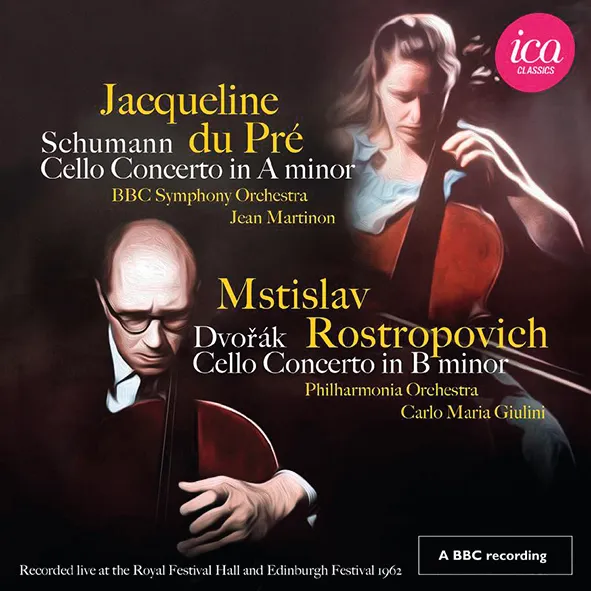
Du Pré • Rostropovich Dvořák: Cello Concerto; Schumann: Cello Concerto; Villa-Lobos: Bachianas Brasileiras No. 5 – Aria Jacqueline du Pré, Mstislav Rostropovich (cello), Galina Vishnevskaya (soprano); BBC Symphony Orchestra/Jean Martinon; London Symphony Orchestra; Philharmonia Orchestra/Carlo Maria Giulini ICA Classics ICAC5149 74:22 mins
It seems improbable that there should still be an unreleased recording of a major concerto performance by Jacqueline du Pré but, thanks to the BBC, here it is. Their live broadcast dates from 1962, a year after Du Pré’s Wigmore Hall debut, when she was studying (albeit unhappily) with Tortelier in Paris. It was he who persuaded her to replace her gut with steel strings – which aided her projection but reduced the subtlety of her sound – and it’s his rather overblown cadenza she plays here, with crackling verve. If not every note is in place, she displays that electrifying rhythmic instinct that characterises her best performances, and long-breathed melodies are sung with utter naturalness. It’s a performance full of élan, too, from Jean Martinon and the Philharmonia in the Royal Festival Hall, who bring terse direction in the opening and melting wind solos in the Adagio.
This 1962 Dvořák Concerto with Giulini and the Philharmonia has all the hallmarks of Mstislav (‘Slava’) Rostropovich at his height: exceptional muscularity and irresistible idiomatic assurance. It’s a fairly noisy recording, and his sound buzzingly metallic, though the coda of the slow movement has a heart-stopping tenderness. Giulini had a tendency to take his time with Dvořák, and there are episodes of heavy weather, in both the Allegro and Finale, but it’s rewarding to hear Slava respond with such creative generosity.
Even a hum from Vishnevskaya could stop you at a hundred paces: the powerful allure of her soprano anchors this Bachianas Brasileiras No. 5, though the cello choir is only foggily present.
Helen Wallace